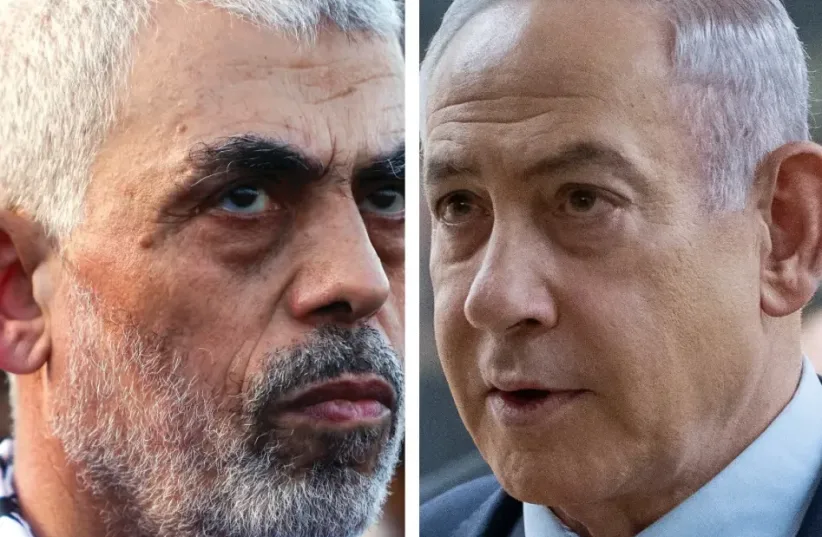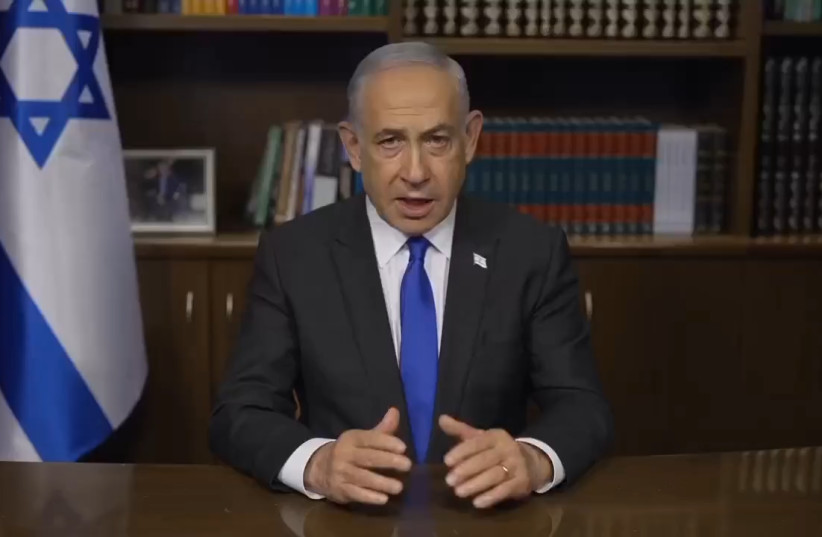Prime Minister Benjamin Netanyahu publicly rejected on Tuesday Hamas’s proposal for a deal – a deal that delayed the return of the hostages and demanded an end to the war – even as he sent a team to Cairo to discuss it.
“The Hamas proposal is very far from [meeting] Israel’s necessary requirements,” he stated in a video message.“Israel cannot accept a proposal that endangers the security of our citizens and the future of our country,” Netanyahu stated.
Israel’s negotiating team, he explained, was instructed “to stand firm” on principled points regarding hostages and security.
IDF has begun a military campaign in Rafah
Simultaneously, he said, the IDF has also begun its military campaign in Gaza to destroy the last Hamas battalions there – four of them – seizing the Palestinian side of the Rafah crossing at the Egyptian border.
He referenced the war cabinet’s decision on Monday night to embark on that operation.
“Within hours our forces raised the Israeli flags at the Rafah crossing and took down the Hamas flags,” he said.
His echoed the tense atmosphere surrounding the talks, which have appeared in the last days to be on the verge of falling apart, even as talks have advanced.
Hamas official Osama Hamdan warned in a press conference in Beirut that if Israel’s military aggression continues in Rafah, there will be no ceasefire deal.
“We affirm that the military operation in Rafah if carried out by Israel, will not be a picnic for the (Israeli) army,” Hamdan said.
“The ball is in Netanyahu’s court,” he added, saying that the latest ceasefire proposal which Hamas agreed to “represents the minimum that responds to the demands of our people and our resistance.”
At issue has been a three-phased deal stretched out over 120 days (four months) that would see the return of all 132 remaining hostages. Of them, Israel has tallied 38 killed hostages. Thirty-three of the 132 are expected to be free in the first phase.
The revised version of the deal pushes back the date by which all hostages would be freed and slows the pace of the releases. It also backs away from the commitment to ensure that all 33 of the hostages freed in the first phase – women, elderly, and infirmed – would be alive, casting doubt as to whether Hamas as 33 hostages in this category that are indeed alive.
The agreement Hamas proposed also clarifies that the war would end and that the IDF would have to withdraw from Gaza.
KAN News reported that an Israeli official blamed mediator countries Egypt and Qatar, as well as the United States, for the negative changes in the latest draft proposal, which caught Jerusalem by surprise.
The official said that the mediators had worked on behalf of Hamas and that the Hamas proposal was a non-starter.US National Security Communications Adviser John Kirby, however, was optimistic when speaking with reporters, explaining that the mere fact that everyone was at the negotiations in Cairo, including CIA Director William Burns, was a positive sign.
“Talks are starting again today in Cairo,” Kirby said. “Bill Burns will be representing us there and a close assessment of the two sides positions suggests that they should be able to close the remaining gaps” between them, he explained.
“We’re going to do everything we can to support that process and achieve that outcome,” he stressed.It’s significant that “everyone is coming to the table,” he said.
Kirby added that the US has “sustained and normal” interactions with Israel as the proposal was “working through the process,” adding that the Biden administration had been “open and transparent” with Israel throughout the process.
The US and Israel have also been in communication about the Rafah operation, he said. Israel told the Biden admiration that the Rafah operation was limited and “designed to cut off Hamas’s ability to smuggle weapons and funds into Gaza,” he said.
The US opposed a major military operation in Rafah, or any operation that does not ensure the protection of civilians, he stated, adding “We’re going to be monitoring the situation very closely.”
He stressed, “We don’t want to see an operation big or small that puts lives at risk.”
Kirby also called on Israel to open the Rafah crossing quickly for humanitarian aid and for Israel to make good on its pledge to open the Kerem Shalom crossing, as seizure of the passageway into Egypt places all the crossings into Gaza back under Israeli control.
In Jerusalem, Netanyahu said that Israel’s control of the Rafah crossing damages Hamas’s governmental capabilities and blocks their ability to travel.
He said that the Rafah operation overall would pressure Hamas to make a deal and advance Israel’s war aim of destroying the terror group.
“We have already proven” that military pressure on Hamas is a necessary condition for the return of our hostages,” he said.
Hamas’s decision to put a new proposal on the table late Monday night was intended to halt the IDF’s entry into Rafah, Netanyahu said, adding that, this “did not happen.”
Yoav Gallant to IDF soldiers
Defense Minister Yoav Gallant entered the Rafah area, telling the soldiers there, “This operation will continue until we eliminate Hamas in the Rafah area and the entire Gaza strip, or until the first hostage returns.”
“We are willing to make compromises in order to bring back hostages, but if that option is removed, we will go on and ‘deepen’ the operation – this will happen all over the [Gaza] strip – in the south, in the center, and in the north.“Hamas only responds to force, so we will intensify our actions, and the military pressure will result in us crushing the Hamas [terrorist] organization,” Gallant stated.
Minister-without-portfolio Benny Gantz, who heads National Unity and is a member of the war cabinet, said that the negotiating team that went to Cairo, “doesn’t just have a mandate to listen – it has an obligation to turn over every stone and act to bring about a framework [agreement]. We all work to make this happen, day by day.”
The international community, however, was more focused on the potential that Israel had in fact begun its major military operation in Rafah, a move which it believes would have dire humanitarian consequences, given that over 1.3 million Palestinians are in that area. Many of them sought shelter there to escape bombings in the north at the start of the war that flattened most of the enclave.
EU foreign policy chief Josep Borrell told journalists, “The Rafah offensive has started again, in spite of all the requests of the international community, the US, the European Union member states, everybody asking (Israeli Prime Minister)Netanyahu not to attack.
“I am afraid that this is going to cause again a lot of casualties, civilian casualties. Whatever they say,” he said, adding: “There are no safe zones in Gaza.”
UN Secretary-General Antonio Guterres said that even Israel’s “best friends” were clear regarding their opposition to a major Rafah operation.
“An assault on Rafah would be a strategic mistake, a political calamity, and a humanitarian nightmare,” Guterres stated.
“I appeal to all those with influence over Israel to do everything in their power to help avert even more tragedy,” he stressed.
“The international community has a shared responsibility to promote a humanitarian ceasefire, the unconditional release of all hostages, and a massive surge in life-saving aid,” Guterres explained.
“It is time for the parties to seize the opportunity and secure a deal for the sake of their own people.”Reuters contributed to this report.

